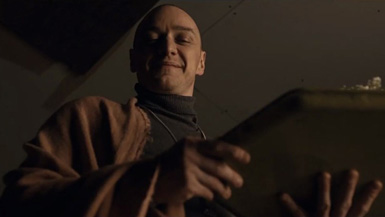|
|
Movie Review: SplitBy Matthew HuntleyJanuary 30, 2017
For starters, his screenplay refrains from necessarily making Dennis a one-dimensional villain whose only purpose is to torment his victims and then be killed later on. It actually develops his condition more deeply by paralleling the girls' ordeal with Dennis's sessions with a psychiatrist as he assumes the personality of Barry, a flamboyant fashion designer. He meets with Dr. Karen Fletcher (Betty Buckley), to whom the movie devotes ample screen time as she attempts to argue that multiple personality disorder is, in fact, real and its ramifications are so powerful that patients living with it may actually prove beneficial to the human race. She argues DID unlocks areas of the brain that yield undiscovered potential and believes a patient's physiology can change based on the personality's beliefs. At a conference, she poses the question, “Is this where our sense of the supernatural comes from?” Perhaps the supernatural isn't so "super" after all. It's hard to say anything more about Split without giving away crucial plot details. Just know that it continually leads us down an uncertain path, an aspect that proved refreshing because our curiosity level remains up most of the time. With that said, though, Split isn't always a captivating experience. We may wonder where it's going, but we don't always care, especially in the beginning when some scenes either feel tacked and/or are hampered by languid dialogue, a slow rhythm, and stiff acting. It's only after the narrative starts to veer off from our preconceived notions that the energy level picks up and we begin to appreciate Shyamalan's strategy and creativity. It takes a while, but the movie gets there. And where Split” ends up does make it worth our while. By the end, we feel we've “put our time in,” so to speak, and the payoff, or in this case, Shyamalan's signature twist, makes us glad we stuck with it. For the most part, this is an unusual and interesting thriller, but there are times when it's also a chilling and tense one, with some arguably gripping moments. This includes one of Casey's flashbacks that shows a really neat shot of a reflection in an eyeball, and another toward the end involving a coat hanger, the outcome of which I didn't expect. Mike Gioulakis' cinematography leverages the enclosed locations well and, through the use of low angles and slow tracking shots, really builds toward and heightens the intensity of the final act. Split may be inconsistent and questionable at times, but it's not a thriller we're likely to forget, and in this case, that's a good thing.
|

|
|
|

|
Thursday, October 31, 2024
© 2024 Box Office Prophets, a division of One Of Us, Inc.


